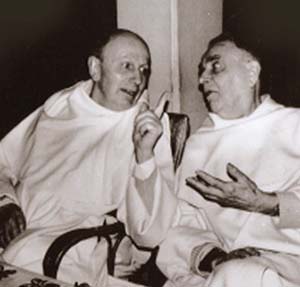 |
Last year and this year, I took a seminar given by my Doktorvater--'Aquinas on Vice' and 'Aquinas on Virtue,' respectively, wherein we were expected to read, re-read, read again, and repeat parts of the Secunda pars on what is (perhaps unfortunately) called "virtue ethics." Marie-Dominiqe Chenu's project of an historical Thomism played no insignificant role in this semester's rubric of exploring régimes d'interaction in Thomas' explication of the human person's concurrent pursuit of felicity and beatitude by exercising virtues and conscientiously overcoming vices. Though, if we had to put a name to the subject-matter of our studies, it would be too facile to call it 'moral philosophy' or 'moral theology,' though we did that. It was, ultimately, a laboratory on how to read Thomas qua Thomas and only carefully to bring in 'schools' of Thomism. (Brian Davies OP tells us that McCabe "hated being called a Thomist.")
On the surface, my experience was fortutitous, almost haphazard; what made it Providential, I dare to say, was studying--ahem--"moral theology" under Prof Dr John Berkman at the Dominican School of Philosophy and Theology (now teaching at Regis College). I had decided to scrub the academic credits I received at my old seminary in Menlo Park (McCormick, Gula, that lot) and give myself a do-over, and boy, am I ever glad I did. Had I not learned about Servais-Théodore Pinckaers OP, neither of my seminars here at DUC would've made as much sense as it did.
I make no secret of my flirtations with dogmatic manuals; neither do I entirely regret that Ratzinger had a hand in their decline. (Nor again am I ashamed that I proudly own a set by Schmaus, despite being a Ratzinger fanboy!) What's striking about the revolving-door introduction and expiration of one manual (and textbook!) to the next is the timelessness of the Summa theologiae such that it can be retrieved on the whole from one generation to the next, and one of the keys to this is precisely the régimes d'interaction rubric bequeathed to us by our professor. Though I haven't yet got an equivalent word for it, "there must needs be" (as the Blackfirars' edition of the Summa is wont to say) a similar rubric for reading (what we would now call) the "dogmatic" parts of Aquinas. In any case, the point is the same: By being attentive to the historical context of Aquinas, his thought can be better transposed from one historical epoch to the next without being ahistorical, charges of la nouvelle théologie notwithstanding. (Which is why, unlike many other faculties, DUC can easily move from Congar to Garrigou-Lagrange without apology.)
What's more, the application of these last two seminars to my doctoral research project has already proven to be a boon, since I was not only taught how to mine the corpus Thomisticum, but also to approach the virtues as a kind of 'rear-view mirror' whereby the Seven Gifts of the Holy Spirit are seen more clearly. The gifts so enhance the virtues that the gifts themselves are "seen" not in se but in the virtues in their heroic mode. So many of my secondary sources have been dead-ends; all I'm left with is to excavate Aquinas' writings in such a way that I find connections that have been overlooked.
It is one thing to read and to memorise St Thomas Aquinas; it is another thing altogether to mine his thinking. The difficulty for me, is this: How would I communicate this skill to seminarians and catechists?



No comments:
Post a Comment
Please ensure that comments are concise, to the point, and substantiated. All laws of English grammar remain in force. Thanks!